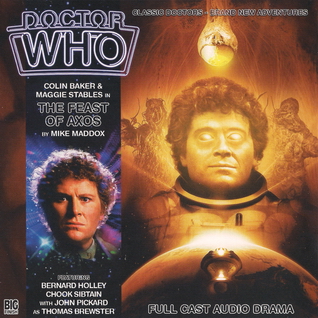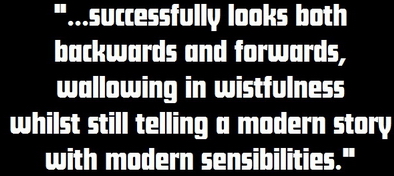|
| |
|
STORY PLACEMENT
THIS STORY TAKES BIG FINISH AUDIO DRAMAS "THE CRIMES OF THOMAS BREWSTER" AND "INDUSTRIAL EVOLUTION."
PRODUCTION CODE 7C/N/B
WRITTEN BY MIKE MADDOX
DIRECTED BY NICHOLAS BRIGGS
WORKING TITLE FOOL'S GOLD
RECOMMENDED PURCHASE BIG FINISH CD#144 (ISBN 1-84435-544-0) RELEASED IN FEBRUARY 2011.
BLURB Many years ago, the vast space parasite Axos TRIED to suck the planet Earth of its energy. Now it’s all but forgotten – a dried-up husk in orbit, still stuck in the time loop it was placed in by Earth’s defender, the Doctor.
Forgotten, that is, BY ALL except tourism MOGUL Campbell Irons – who PLANS to solve EARTH’s energy crisis by reviving Axos, and transmitting ALL its power back to Earth. But the crew of the spaceship Windermere aren’t alone aboard the parasite... The Doctor has returned, to correct an error of decades past…
And Axos is waiting. |
|
|
The Feast of Axos FEBRUARY 2011 (4 EPISODES)
Although the dearth of Axon appearances in Doctor Who literature is surprising, their hitherto failure to make an audio appearance is not. With its spaghetti monsters and its violent gold visuals, The Claws of Axos was responsible for some of the Pertwee era’s most enduring images – images that I’d have thought would be difficult to recreate in the world of sound. However, as soon I set eyes on Anthony Lamb’s remarkable cover illustration, which depicts Colin Baker’s Doctor (or at least an Axonite duplicate of him) bathed in eerie golden light, his eyes now two pathognomonic Axon orbs, I realised that I’d been too hasty. Perhaps Axos could survive the transition to audio...
The Feast of Axos does an incredibly convincing job of taking the rampant psychedelia of Claws and reproducing it in an equally vivid and arresting soundscape. Jamie Robertson’s cosmic sound design has to be of the most polished jobs that he’s done for Big Finish, but I think what really sets this production apart is the presence of Bernard Holley, who reprises the role of Axos for the first time in nearly forty years. Listening to him breathing life into the nearly-called Vampire from Space again is incredibly unsettling – I’d swear that had I heard his voice crackling across a loudspeaker in a supermarket or a stadium, or even hollering in the street, the hairs on the back of my neck would have stood up and I would’ve been looking for spaghetti monsters.
Above: A Vampire or a victim? It depends on who’s around…
The premise itself is an interesting inversion of the Bristol Boys’ original 1972 storyline. The third Doctor and UNIT’s encounter with the wily parasite saw it try to drain the Earth of all its energy, whereas Mike Maddox’s script sees 21-century human astronauts trying to harvest Axos’s power in order to solve the energy crisis – and, more importantly, raise a few billion quid. It’s an intriguing riff on the original idea, and beautifully executed. What’s more, like so many recent releases, it has a powerful hook for long-time fans, building a bridge between the UNIT world of British Space Programmes, the “Virgin Galactic” present, and the bleak future of The Waters of Mars, with just enough fleeting references to “Eurozones” and the like to have listeners picturing the likes of Learman and Salamander running rampant on the globe below. Some might say Maddox and his script editor, Alan Barnes, have over-egged the pudding a little, but not me.
Indeed, for all its wonderful fan service, Feast is a decidedly grim tale; much more serious than The Crimes of Thomas Brewster that it picks up from. The story’s tone is as dark and as cold as the space that houses it – Axos is a dried-up husk, marooned in temporal orbit; humanity is desperate, but that desperation doesn’t temper its greed; and the Doctor and Brewster are so very similar, yet so very different, that they can’t help but rile each other, the Time Lord’s pompous obstinacy ultimately forcing young Brewster down his darkest path yet. Even Evelyn faces her most harrowing and heartbreaking cliffhanger to date - one that lends the CD booklet’s beautifully-retro centrefold (below) the most haunting quality.
element is the interplay between the three main characters. Each is written and performed so very well that, even if they weren’t busy trying to stop a misguided bunch of humans inadvertently causing a time-looped space vampire to ravage the planet, they would still have listeners on the edge of their seats. John Pickard’s Brewster is effectively kidnapped by the Doctor, who won’t take him home in case he tries to use his foreknowledge for gain and thus change history, rendering him a cornered Victorian animal – one ripe for manipulation at the cilia of a force that can use its chameleonic element to produce money, gold or even a time machine for the right price. Colin Baker, meanwhile, gives a suitably “golden performance” as both the Brewster-incensed Doctor and his Axonite duplicate. The Time Lord’s double-standards are there for all to see here, embedded in his words as early as the first act as he speaks of having been exiled by his own people for stealing a TARDIS and interfering with history. Maggie Stables’ Evelyn is arguably even more impressive: rather than be sidelined with a planet in her head, The Feast of Axos sees “Old Lady Smythe” at her matronly best, bringing out the good in the boy Brewster, and making damned sure that the Doctor recognises it.
Overall, I
don’t think that I could have been any more impressed with this play. Like
many of the most popular Big Finish releases, The Feast of Axos
successfully looks both backwards and forwards, wallowing in wistfulness
whilst still telling a thoroughly modern story with mod-ern sensibilities.
It may lack the lovely light touches of the previous release, but it more
than makes up for its brutal solemnity with some exceptional
characterisation and truly agonising suspense. Pure gold.
|
|
|
Copyright © E.G. Wolverson 2011
E.G. Wolverson has asserted his right under the Copyright, Designs and Patents Act, 1988 to be identified as the author of this work. |
|
|
Unless otherwise stated, all images on this site are copyrighted to the BBC and are used solely for promotional purposes. ‘Doctor Who’ is copyright © by the BBC. No copyright infringement is intended. |
|

.jpg)

.jpg)
.jpg)
 Nevertheless,
the play’s strongest
Nevertheless,
the play’s strongest